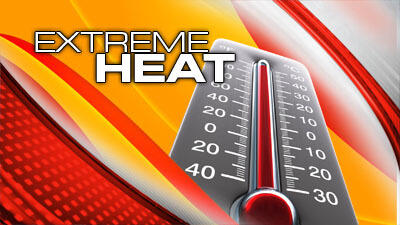The heat of summer is here! Extreme heat is defined as a long period (2 to 3 days) of high heat and humidity with temperatures above 90 degrees. High heat levels can affect your home and cause unexpected power outages. Ready.gov provides tips on how to keep your home cool and what to do before and during an outage.
Remember that:
- Extreme heat can occur quickly and without warning.
- Older adults, children, and sick or overweight individuals are at greater risk from extreme heat.
- Humidity increases the feeling of heat as measured by a heat index.
- Heatwaves often cause power outages.
Prepare for Extreme Heat.
Keep your home cool by doing the following:
- Cover windows with drapes or shades.
- Weather-strip doors and windows.
- Use window reflectors, such as aluminum foil-covered cardboard, to reflect heat back outside.
- Add insulation to keep the heat out.
- Use attic fans to clear hot air.
- Install window air conditioners and insulate around them.
Prepare for a Power Outage.
- Find places in your community where you can go to stay cool.
- Take an inventory of the items you need that rely on electricity.
- Plan for batteries and other alternatives to meet your needs when the power goes out.
- Sign up for local alerts and warning systems. Monitor weather reports.
- Turn off or disconnect appliances, equipment, or electronics. Power may return with momentary “surges” or “spikes” that can cause damage.
- Install carbon monoxide detectors with battery backup in central locations on every level of your home.
- Build an emergency kit. Review the supplies that are available in case of a power outage. Have flashlights with extra batteries for every household member. Have enough nonperishable food and water.
- Have a thermometer available to use to monitor the refrigerator and freezer until the power is restored. Throw out food if the temperature is 40 degrees or higher.
For more info on extreme heat, check out https://www.ready.gov/heat.
For more tips to stay safe during a power outage, visit https://www.ready.gov/power-outages.








